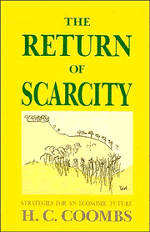Book contents
- Frontmatter
- Contents
- Introduction
- 1 Towards a Sustainable Society
- 2 Scarcity, Wealth and Income
- 3 Matching Ecological and Economic Realities
- 4 Science and Technology - For What Purpose?
- 5 Economic and Ecological Issues in Resource Management
- 6 Resource Management and Environmental Law
- 7 The Quality of life and Its Assessment
- 8 Is Democracy Alive and Well?
- 9 Technology, Economic Change and Political Strategy
- Bibliography
9 - Technology, Economic Change and Political Strategy
Published online by Cambridge University Press: 05 August 2012
- Frontmatter
- Contents
- Introduction
- 1 Towards a Sustainable Society
- 2 Scarcity, Wealth and Income
- 3 Matching Ecological and Economic Realities
- 4 Science and Technology - For What Purpose?
- 5 Economic and Ecological Issues in Resource Management
- 6 Resource Management and Environmental Law
- 7 The Quality of life and Its Assessment
- 8 Is Democracy Alive and Well?
- 9 Technology, Economic Change and Political Strategy
- Bibliography
Summary
Originally presented as two separate papers: ‘Technology, Income Distribution and the Quality of Life’. Presented as the John Murtagh Macrossan Lecture. University of Queensland, Brisbane, Queensland, March 1980; subsequently published in Search 13(5-6) 1982; and ‘Economic Change and Political Strategy’. Presented as the Chamberlain Lecture. University of Western Australia, Perth, WA, December 1980.
THERE is nothing divinely ordained about the economic system: it is the product of human ingenuity, effort and capacity to organise and, therefore, can properly be questioned, criticised and, if a better alternative exists, rejected. Its justification lies in a conviction that, despite defects, it has provided the populations of western industrialised nations with rising material standards of living over the last two centuries. It has been reasonable to believe that those standards are being increasingly shared by the poorest groups in those societies. It has also seemed reasonable to believe that as its techniques and processes are adopted by other less industrially organised societies, they too will share the experience of the industrial west.
This pattern of beliefs has continued to seem reasonable through changes in the structure of the economic system which, inter alia, have meant that the great majority of the population must now depend on employment for wages or salary for their share in what the economic system produces. In oversimplified terms, the system has been justified by the expectation that it would provide employment at increasing real wage levels for those seeking it.
- Type
- Chapter
- Information
- The Return of ScarcityStrategies for an Economic Future, pp. 143 - 165Publisher: Cambridge University PressPrint publication year: 1990



